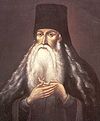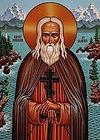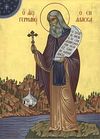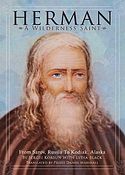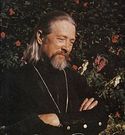

| Previous day | Next day |
| Old Style
November 15
|
Sunday |
New Style
November 28
|
|
23rd Sunday after Pentecost.
Tone 6.
Beginning of the Nativity Fast. |
Fish, wine and oil allowed.
|
![]() Martyrs and Confessors Gurias and Samonas (299-306),
Martyrs and Confessors Gurias and Samonas (299-306), ![]() and Abibus (322), of Edessa.
and Abibus (322), of Edessa. ![]() St. Paisius (Velichkovsky) of Moldavia and Mt. Athos (1794).
St. Paisius (Velichkovsky) of Moldavia and Mt. Athos (1794).
Martyr Demetrius of Thrace (307). Martyrs Elpidius, Marcellus, and Eustochius, who suffered under Julian the Apostate (361). St. Philip, founder of Rabang Monastery (Vologda) (1457).
“Kupyatich” Icon of the Most Holy Theotokos (1182).
Repose of St. Herman, Wonderworker of Alaska (1836). St. Quinctian, bishop of Seleucia (4th c.). St. Thomas the New, patriarch of Constantinople (665- 668).
Repose of Abbot Arsenie Boca of Romania (1989).
Thoughts for Each Day of the Year
According to the Daily Church Readings from the Word of God
By St. Theophan the Recluse

Twenty Fifth Sunday After Pentecost. [Eph. 4:1-6; Luke 10:25-37]
To the man who asked how to be saved, the Lord on his part offered a question: What is written in the law? how readest thou? By this He showed that to resolve all perplexity one must turn to the word of God. And so that there will not be such perplexity at all it is best to always read Divine Scripture attentively, with discernment and sympathy, applying it to your own life, and fulfilling in your own thoughts what relates to thoughts, in your own feelings and dispositions what relates to the senses, and in your deeds what relates to deeds. One who hearkens to the word of God gathers bright understanding of all that is in him, what is near to him, and what is above him; he clarifies his obligations in all aspects of life, and holy rules, like valuable pearls, are strung onto the thread of his conscience, which then precisely and definitely indicate how and when to act so that he please the Lord. He tames the passions—something reading the word of God always acts to assuage. No matter what passion troubles you, begin to read the word of God and the passion will become quieter and quieter, and at last it will be entirely calmed. He who enriches himself through knowledge of the word of God is overshadowed by the pillar of cloud which guided the Israelites in the desert.
Articles
 Venerable Paisius VelichkovskySaint Paisius Velichkovsky was born in Poltava in Little Russia on December 21, 1722, and was the eleventh of twelve children. |
 Martyrs Elpidius, Marcellus, and Eustochius, who suffered under Julian the ApostateThe martyrs endured many terrible torments, and they died after being thrown into a fire. |
 Icon of the Mother of God of KupyatichThe Kupyatich Icon of the Mother of God appeared in the year 1180 near the village of Kupyatich in the area of the former Pinsk district of the Minsk governance. |
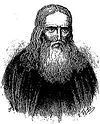 Canon to St. Herman of AlaskaFrom the Service to our Holy and God-Bearing Father, Saint Herman, Wonderworker of Alaska. |
 The Relics of St. Herman of AlaskaThe story of Saint Herman of Alaska. 2007. |



